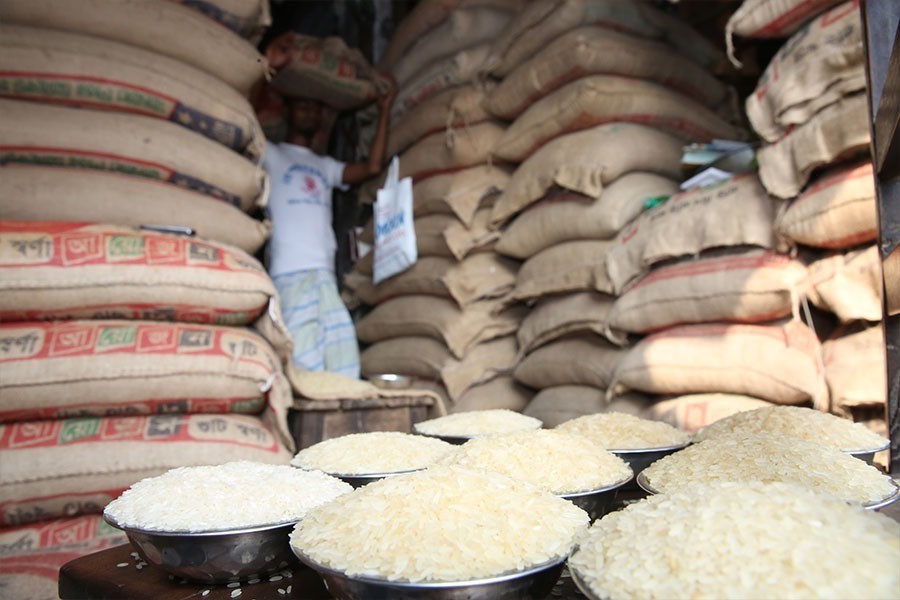Rice became even more costly on Tuesday, when the government started its drive against hoarding of the staple.
The price of coarse rice increased further by Tk 2.0-4.0 a kg in the city markets to hit a maximum of Tk 53 a kg on the day, according to groceries.

The medium variety of BRRI dhan 28 hit a maximum of Tk 60 a kg while regular finer varieties of Miniket, Najirshail and parboiled Banglamoti retailed at Tk 70-85 a kg while branded ones marketed by Pran, ACI, Square, Aarong, BEOL and others at Tk 82-89 a kg.
If the trend continues, the rice price might reach the level of 2017 when it surged to an all time high, apprehended the manager of a grocery at Katashur in Mohammadpur, informing that the price of coarse rice went up to Tk 57 a kg then.
Ajibor Rahman said the prices started increasing from the third week of April this year and are still continuing despite the fact that it is a peak Boro harvesting season.
But the level of hike in the last one week by Tk 6.0-8.0 a kg is mounting concerns among the consumers as well as the traders, he added. "High price at the wholesale means less profit for the retailers despite putting more money on the item."
Mahajon (owner of a grocery or shop) might procure a smaller quantity of rice than normal, fearing that it would be tough to sell a huge quantity at such high rates, he added.
Md Awlad Hossain, a grocer at West Dhanmondi, said the price might rise further with the end of old stock.
"We are selling BRRI dhan 28 at Tk 58-60 a kg which were purchased at Tk 53.5 a kg. The price reached Tk 55 now at the wholesales," he said.
The wholesale prices further increased by Tk 3.0-4.0 a kg in the city as the seasonal and last season coarse rice was traded at Tk 46-50, medium Tk 54-55 and finer Tk 64-75 a kg on the day, according to the DAM and wholesale markets in the city.
Meanwhile, the food ministry on Tuesday launched its drives against the illegal stockpiling of paddy and rice amid the sky-rocketing prices of the staple in the market.
Eight teams, led by the ministry, started the drive with Babu Bazar wholesale market in Dhaka at 3:45 pm on the day, according to the ministry.
The team members have been appointed to see whether anyone is involved in creating an artificial crisis through illegal hoarding.
Harun-ur-Rashid, deputy secretary at the ministry who led a team at Babu Bazar, said that many of the traders fled the scene as they heard about the arrival of the team.
"We found no sign of hoarding by the shops that remained open, but there were some mismatches with their licences," he said.
Meanwhile, the Directorate of National Consumers Right Protection (DNCRP) conducted a drive at the city's Mohammadpur Krishi Market wholesale on the same day.
Most of the shops were also found closed there, said DNCRP officials.
The decision on the drive was taken by the food ministry at a meeting on Tuesday, chaired by Food Minister Sadhan Chandra Majumder.
The meeting decided to send semi-official letters to the deputy commissioners, upazila nirbahi officers, NSI, RAB and DNCRP to prevent illegal stockpiling.
The minister also directed the officials to hold an inter-ministerial meeting of agriculture, food and commerce in this regard soon.
A control room has also been opened in the food ministry regarding the issue. All concerned have been requested to call at +88-02-2233802113, 01790499942 and 01713003506 to report any information they have about hoarding.
Earlier on Monday, the prime minister had instructed the officials concerned to take strict action against those involved in illegal hoarding.
She also directed the commerce, food and agriculture ministers and their secretaries to take immediate steps to find out the reasons behind such price hikes through regular monitoring and supervisions.


